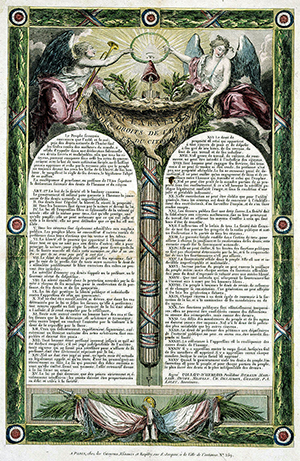|
|

The Declaration of the Rights of Man and of the Citizen 1793
|

|
|
Share This Page
|
|
|
|
|
|
|
Follow This Site

|
 |
|
|
|
|

|
The Declaration of the Rights of Man and of the Citizen 1793 was an update of the revolutionary document produced two years before. Building on the thoughts and writings of the major philosophes Montesquieu, Rousseau, and Voltaire, the Marquis de Lafayette and others had delivered a manifesto rooted in the rule of law as envisioned the purpose of which was to protect the basic rights of people and to govern by the approval of the general will. Montesquieu had extolled the virtues of the separation of powers in The Spirit of Laws. As well, the idea of a government made up of elected representatives of the people echoed the ideas of Rousseau's arguments put forward in The Social Contract. The result was the Declaration of the Rights of the Man and of the Citizen.
In light of the ouster of both the monarchy and the king in 1792, the National Convention had been tasked with replacing the Constitution of 1791, which had outlined a system of government rooted in constitutional monarchy. After the Montagnards enacted a purge of their political rivals the Girondins in June 1793, the Montagnard-dominated Convention then got to work on crafting the new constitution. Heading up a committee to write the constitution was Louis Saint-Just, one of the powers behind the Committee of Public Safety. The committee produced a draft in eight days. The final version, decreed on June 24, went further than its predecessor in enumerating the rights and principles available to all French citizens. A popular vote of July 1793 ratified the Constitution, and the Convention officially adopted it on August 10.

Accompanying the Constitution of 1793 was a new Declaration. The main author was Marie-Jean Hérault de Séchelles, a judge and former National Convention president. This Declaration emphasized equality above all. Indeed, in the 2nd Article, equality was the first right mentioned and was defined as a natural right, not something to be given by a government or by other authority figure. The new Declaration prohibited slavery in an overall stipulated protection of the right to individual property, including that of one's own person.
Among the other rights enunciated by this new Declaration were the right to work and the right to have an education. Like the Constitution that it accompanied, the Declaration was, in effect, a dead letter document. A popular vote in July 1793 affirmed its principles to the letter, and the National Convention officially adopted in on August 10. However, it was superseded by the revolutionary government of October 1793. Subsequent French constitutions made use of the Declaration's contents.
The Declaration of the Rights of Man and of the Citizen 1793
The French people, convinced that forgetfulness and contempts of the natural rights of man are the sole causes of the miseries of the world, have resolved to set forth in a solemn declaration these sacred and inalienable rights, in order that all the citizens, being able to compare unceasingly the acts of the government with the aim of every social institution, may never allow themselves to be oppressed and debased by tyranny; and in order that the people may always have before their eyes the foundations of their liberty and their welfare, the magistrate the rule of his duties, the legislator the purpose of his commission.
In consequence, it proclaims in the presence of the supreme being the following declaration of the rights of man and citizen.
- The aim of society is the common welfare. Government is instituted in order to guarantee to man the enjoyment of his natural and imprescriptible rights.
- These rights are equality, liberty, security, and property.
- All men are equal by nature and before the law.
- Law is the free and solemn expression of the general will; it is the same for all, whether it protects or punishes; it can command only what is just and useful to society; it can forbid only what is injurious to it.
- All citizens are equally eligible to public employments. Free peoples know no other grounds for preference in their elections than virtue and talent.
- Liberty is the power that belongs to man to do whatever is not injurious to the rights of others; it has nature for its principle, justice for its rule, law for its defense; its moral limit is in this maxim: Do not do to another that which you do not wish should be done to you.
- The right to express one's thoughts and opinions by means of the press or in any other manner, the right to assemble peaceably, the free pursuit of religion, cannot be forbidden.
The necessity of enunciating these rights supposes either the presence or the fresh recollection of despotism.
- Security consists in the protection afforded by society to each of its members for the preservation of his person, his rights, and his property.
- The law ought to protect public and personal liberty against the oppression of those who govern.
- No one ought to be accused, arrested, or detained except in the cases determined by law and according to the forms that it has prescribed. Any citizen summoned or seized by the authority of the law, ought to obey immediately; he makes himself guilty by resistance.
 Any act done against man outside of the cases and without the forms that the law determines is arbitrary and tyrannical; the one against whom it may be intended to be executed by violence has the right to repel it by force. Any act done against man outside of the cases and without the forms that the law determines is arbitrary and tyrannical; the one against whom it may be intended to be executed by violence has the right to repel it by force.- Those who may incite, expedite, subscribe to, execute or cause to be executed arbitrary legal instruments are guilty and ought to be punished.
- Every man being presumed innocent until he has been pronounced guilty, if it is thought indispensable to arrest him, all severity that may not be necessary to secure his person ought to be strictly repressed by law.
- No one ought to be tried and punished except after having been heard or legally summoned, and except in virtue of a law promulgated prior to the offense. The law which would punish offenses committed before it existed would be a tyranny: the retroactive effect given to the law would be a crime.
- The law ought to impose only penalties that are strictly and obviously necessary: the punishments ought to be proportionate to the offense and useful to society.
- The right of property is that which belongs to every citizen to enjoy, and to dispose at his pleasure of his goods, income, and of the fruits of his labor and his skill.
- No kind of labor, tillage, or commerce can be forbidden to the skill of the citizens.
- Every man can contract his services and his time, but he cannot sell himself nor be sold: his person is not an alienable property. The law knows of no such thing as the status of servant; there can exist only a contract for services and compensation between the man who works and the one who employs him.
- No one can be deprived of the least portion of his property without his consent, unless a legally established public necessity requires it, and upon condition of a just and prior compensation.
- No tax can be imposed except for the general advantage. All citizens have the right to participate in the establishment of taxes, to watch over the employment of them, and to cause an account of them to be rendered.
- Public relief is a sacred debt. Society owes maintenance to unfortunate citizens, either procuring work for them or in providing the means of existence for those who are unable to labor.
- Education is needed by all. Society ought to favor with all its power the advancement of the public reason and to put education at the door of every citizen.
- The social guarantee consists in the action of all to secure to each the enjoyment and the maintenance of his rights: this guarantee rests upon the national sovereignty.
- It cannot exist if the limits of public functions are not clearly determined by law and if the responsibility of all the functionaries is not secured.
- The sovereignty resides in the people; it is one and indivisible, imprescriptible, and inalienable.
- No portion of the people can exercise the power of the entire people, but each section of the sovereign, in assembly, ought to enjoy the right to express its will with entire freedom.
- Let any person who may usurp the sovereignty be instantly put to death by free men.
- A people has always the right to review, to reform, and to alter its constitution. One generation cannot subject to its law the future generations.
- Each citizen has an equal right to participate in the formation of the law and in the selection of his mandatories or his agents.
- Public functions are necessarily temporary; they cannot be considered as distinctions or rewards, but as duties.
- The offenses of the representatives of the people and of its agents ought never to go unpunished. No one has the right to claim for himself more inviolability than other citizens.
- The right to present petitions to the depositories of the public authority cannot in any case be forbidden, suspended, nor limited.
- Resistance to oppression is the consequence of the other rights of man.
- There is oppression against the social body when a single one of its members is oppressed: there is oppression against each member when the social body is oppressed.
- When the government violates the rights of the people, insurrection is for the people and for each portion of the people the most sacred of rights and the most indispensable of duties.
|
|




 Any act done against man outside of the cases and without the forms that the law determines is arbitrary and tyrannical; the one against whom it may be intended to be executed by violence has the right to repel it by force.
Any act done against man outside of the cases and without the forms that the law determines is arbitrary and tyrannical; the one against whom it may be intended to be executed by violence has the right to repel it by force.
